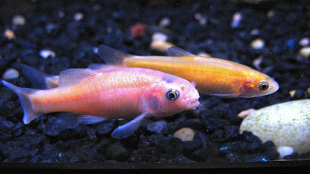 WIKIMEDIA COMMONS, ENZIARRO
WIKIMEDIA COMMONS, ENZIARRO
Active pharmaceuticals often find their way to the world’s drinking water, though the consequences of this are largely unknown. Now, new research published yesterday (June 6) in PLoS ONE, identifies at least one possible outcome—altered gene expression. Fathead minnows exposed to psychoactive medications in the water showed gene expression profiles that are associated with autism spectrum disorder in humans. The results suggest a potential environmental trigger for autism spectrum disorders (ASD) in genetically susceptible populations, and may explain the association between antidepressant use by pregnant women and ASD in their kids.Michael Thomas of Idaho State University and colleagues tested three psychoactive pharmaceuticals—fluoxetine, a selective serotonin reuptake inhibitor (SSRI); venlafaxine, a serotonin-norepinephrine reuptake inhibitor; and carbamazepine, used to control seizures. They used concentrations estimated to be ...




















